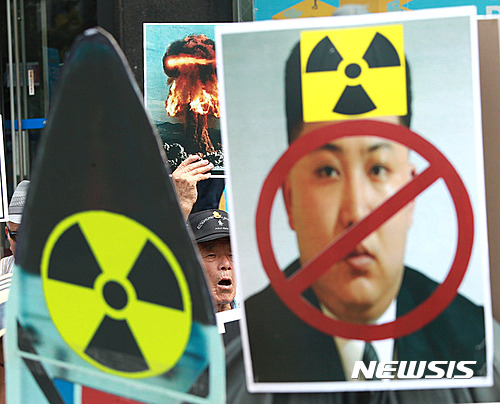Where are Seoul-Beijing ties heading?

FILE – In this file photo taken on Saturday, Sept. 10, 2016, a South Korean protester shouts slogans during a rally denouncing North Korea’s latest nuclear test in Seoul, South Korea, Saturday, Sept. 10, 2016. On Monday, China said the United States has inflamed the conflict on the Korean Peninsula and must carry the burden of ending it in the wake of North Korea’s fifth nuclear test. (AP Photo/Ahn Young-joon)
John Burton – The Korea Times
The recent explosion of North Korea’s fifth and biggest nuclear bomb raises a key question of the whether the test will bring South Korea and China closer together or further apart.
The test has hardened President Park Geun-hye’s determination to deploy the U.S. advanced missile defense system, Terminal High Altitude Area Defense (THAAD), with a majority of Koreans supporting the decision. Park recently said the deployment was an “inevitable defensive measure,” adding there would be no need for THAAD if Pyongyang abandoned its nuclear weapons program.
A retreat from the THAAD decision now appears to be unthinkable in the face of Pyongyang’s accelerated nuclear and missile tests, including the unexpectedly successful launch of a submarine-based missile, which theoretically would lead to North Korea gaining a “second strike capability.”
Beijing fiercely opposes the THAADdeployment because the range of the system’s radar could help plot Chinese missiles once they are launched, thus undermining its nuclear deterrent. This has heightened Chinese fears of encirclement by a coalition of U.S. allies, including South Korea and Japan.
What has added to Beijing’s fury is that it believes it has been cooperative in carrying out the latest round of sanctions against North Korea that were stipulated by the UN Security Council in March in response to previous nuclear and missile tests by Pyongyang. The sanctions ban countries from buying some North Korean mineral products, which are estimated to account for 60 percent of Pyongyang’s hard currency income, with 90 percent of North Korean total trade being conducted with China.
China has already made known its displeasure about the THAAD decision by cracking down on imports of Korean cosmetics, banning the appearance of K-pop stars, and preventing Korea electric battery makers from supplying Chinese electric vehicle producers. If Seoul does not back down on THAAD, some fear that China could adopt even tougher measures on imports from South Korea. “Mishandling the issue is not conducive to strategic stability in the region and could intensify conflicts,” Chinese President Xi Jinping warned Park at recent G20 Summit in Hangzhou.
It would appear that Seoul’s recent attempts to pursue a delicate balancing act between Beijing and Washington are doomed. While South Korea remains a staunch military ally of the U.S., China has been its biggest trading partner, consuming a quarter of Korean exports.
But a counter argument can be made that the fifth nuclear test may now convince China that it must be tougher in vigorously enforcing sanctions against Pyongyang, which threatens to upset the strategic balance in Northeast Asia. North Korea’s nuclear breakout could increase support in Japan and South Korea to acquire their own nuclear weapons. Both Japan and South Korea might also seek to forge defense ties with other Asian countries, such as Vietnam and India, which are seen as opposing Chinese regional expansion. Such developments would increase Chinese fears of containment.
One hopeful sign was an announcement by the Foreign Ministry in Seoul last week that China had agreed with South Korea to seek new and tougher UN sanctions on North Korea. How far will China go in accepting and imposing new sanctions remains to be seen. It might also seek a trade-off: in return for implementing harsh sanctions, Beijing would expect the THAAD deployment to be abandoned.
Another issue is how tough sanctions need to be to persuade North Korea to abandon its nuclear and missile programs. It appears better able to withstand sanctions than five or ten years ago. Market-based economic reforms appear to have improved living standards, which is suggested by the fact that prices of imported goods in North Korea have remained stable. The black market rate exchange rate for U.S. dollars is also stable, indicating that the country is not suffering a foreign currency shortage. This reduces the odds of regime collapse.
The test of China’s willingness to tighten the screws on North Korea would not only be more effective implementation of current and future UN sanctions, but its ability to work together with South Korea, and the U.S. in applying economic pressure. Such cooperation would have the added benefit of identifying one area where Beijing and Washington have shared interests and perhaps help reduce mutual mistrust.
This was also conclusion of a report by a U.S. group of North Korea experts released this month by the Council on Foreign Relations. It concluded that “although China remains North Korea’s primary patron, it is increasingly willing to exert pressure to curb the [North Korean] regime’s erratic behavior.” It also recommended that the U.S. and South Korea should talk to China about future scenarios about a reunified Korea.
It suggested that ways to win Chinese support and make it more cooperative would be include offering guarantees that Beijing’s interests would not be damaged in the case of Korean unification, such as possibly reducing the presence of the U.S. military on the Korean peninsula.

























































